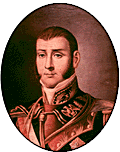 |
|
INDEPENDENCE: THE REPUBLICAN ERA
 n the 18th century, Creoles (Spaniards born in the Americas) began to resent being governed by an overseas government. A sense of independent Creole identity and destiny grew. Although Creole and mestizo enterprises were responsible for bringing great wealth to Spain, only European-born nobles were allowed to hold high office in the colonies. Spain monopolized all trade in her colonies by enforcing strict trade laws. Tired of Spanish domination, Creole leaders issued calls for independence and took up arms. Most Latin American countries were independent by 1825.
n the 18th century, Creoles (Spaniards born in the Americas) began to resent being governed by an overseas government. A sense of independent Creole identity and destiny grew. Although Creole and mestizo enterprises were responsible for bringing great wealth to Spain, only European-born nobles were allowed to hold high office in the colonies. Spain monopolized all trade in her colonies by enforcing strict trade laws. Tired of Spanish domination, Creole leaders issued calls for independence and took up arms. Most Latin American countries were independent by 1825.
Agustín de Itúrbide was a major hero in Mexico’s fight for independence from Spain. He became the country’s first emperor, but was later executed by political opponents.
|
|

 Setting the Stage Setting the Stage
 The Encounter The Encounter
 Colonial Life Colonial Life
 Independence Independence

| |
